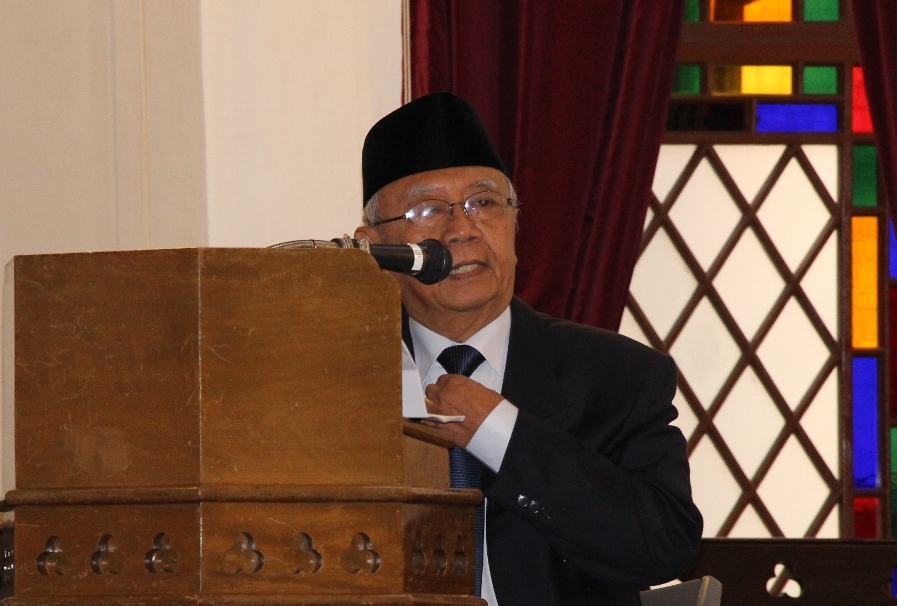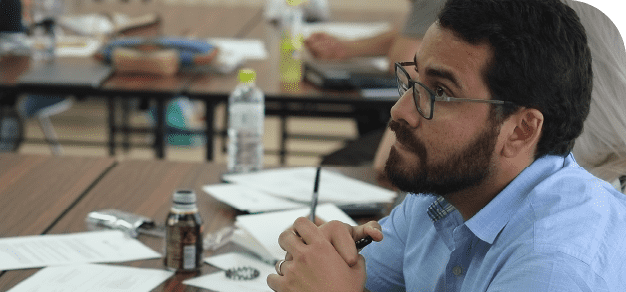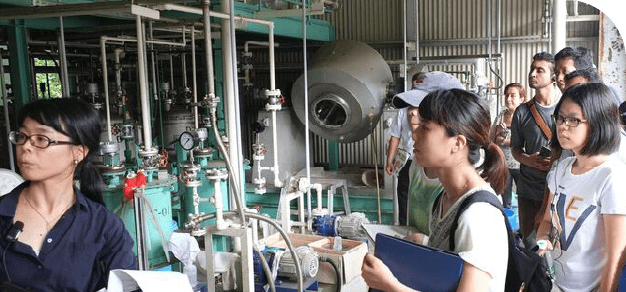GRM Students’ Reports
Social Activity of Nahdlatul Ulama: Coexistence of Plural Communities through Empowerment of Local Communities
Graduate School of Global Studies Naomi NISHI
2013/05/10
GRM Lecture Series
Date: May.10 (Fri), 2013
Venue: IMADEGAWA,Chapel
Theme: "Social Activity of Nahdlatul Ulama: Coexistence of Plural Communities through Empowerment of Local Communities"
Lecturer: Dr.Salahuddin Wahid (Leader of Nahdlatul Ulama, Indonesia)
*********************************************
[Overview of the Lecture]
1. Introduction
After 9/11, prejudice toward Muslims is increasing around the world, especially in the West. One of the countries that play a critical role to improve the situation is Indonesia, which promotes pluralism and moderate Islam.
Indonesia holds the largest Muslim population in the world. Nahdlatul Ulama (“NU”), which promotes moderate Islam, is the biggest Islamic NGO in Indonesia. It is followed by Muhammadiya, which emphasizes more modernized Islam. In East Java (Java), NU related organizations exist and are active in every level of society, including the rural areas.
Indonesia is a country that has been pursuing unity in diversity. However, many people now question whether Indonesians will remain moderate Muslims or become more radical in the future. Indeed, there are radical Islamist groups in Indonesia.
2. Historical Background
It is important to know the historical background to analyze the current situation and tendency in the future. Indonesia consists of different races, ethnicities, religions, and cultures with different backgrounds and origins.These various factors have coexisted for centuries. Before Islamization of the region began around the 15th century, Indonesia already had a foundation of pluralism that respected different cultures or thoughts.
Wali, a Muslim intellectual, played an important role in spreading teachings of Islam.Wali respected the local customs, which were dominated by Hinduism and Buddhism. Under this circumstance, Muslims were able to develop mutual respect, understanding, and tolerance of others. Pluralism is the main feature of Indonesia.
3. Establishment of Nahdlatul Ulama
On January 31, 1926, NU was founded in Surabaya(the capital of East Java Province) to form a new organization to accommodate and coordinate local ulamas (Islamic religious scholars) in Indonesia with the wide cooperation of local traditionalist ulamas. The NU succeeded because it had the support of the local Pesantren (Islamic boarding school), and it made the best of this existing network.
In 2001, according to statistics provided by the Ministry of Religious Affairs, more than 40% of Muslims in Indonesia borrowed the ideas of NU, but they were not necessarily involved in NU as a member. NU follows the following basic principles:(1) moderate attitude; (2)maintenance of harmony; and (3) balance in everything, including using rational justifications based on the Qur’an (the holy book of Islam) and Sunnah (the words and/or activity and/or attitude of the prophet Muhammad, which is accepted by Muslims as the second highest source of law after the Qur’an). NU tries to promote generosity, mutual understanding, and cooperation beyond ethnicity, language, culture, politics, and religion. It tries to do so by empowering local communities while focusing on three basic elements: human relations, relations with the state, and relations with other Muslims.
4. Tolerance as a Part of Religious Teaching
Tolerance, a characteristic of NU, was subject to a new interpretation. Here, tolerance becomes part of the religious teaching of Islam. As mentioned in the Qur’an, we cannot force our own belief on anyone, especially by using any force or violence. If by any chance we see some people using violence in the name of religion, they are actually doing that based on their own interest, not because of religion.
Many of the members of NU are activists as well, promoting human rights, community development, and inter-faith dialogue. NU has established a good relationship with other religions based on networking at a grassroots level.
After 1984, NU resigned from the political arena and focused on social activity, especially primary education, by establishing Pesantren.The number of Pesantren has increased over the last five years. However, the quality of Pesantren needs to be improved so that competitiveness will increase and the schools can face the challenges of globalization.
In order to prevent conflict and develop the rural areas, where people are marginalized by the government, NU and its related organizations conduct various activities to empower local society.
5. Challenges to Pluralism
Indonesian people are generally moderate, but there is an undeniable tendency that support for religious conservatives is also increasing. An attitude of intolerance is increasing, as is the number of violent attacks. Some groups justify the violence. Among the religious conservative groups, it seems social pluralism is accepted but religious pluralism is rejected. Islam is a religion with no distinction of race or color,whether civilians or soldiers, rulers or subjects.We have to note that pluralism itself is not against the teaching of Islam.
Detail of Lecture (Japanese)



